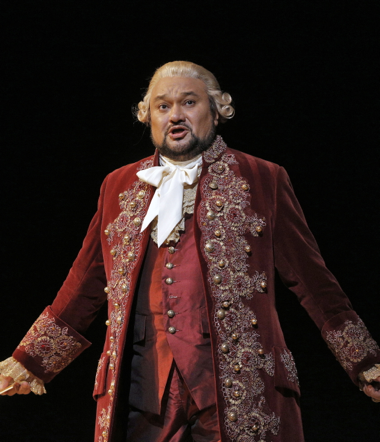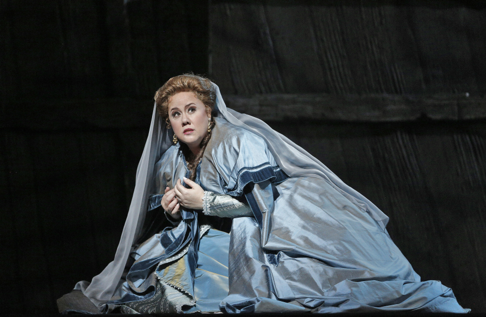Recently in Reviews
English Touring Opera are delighted to announce a season of lyric monodramas to tour nationally from October to December. The season features music for solo singer and piano by Argento, Britten, Tippett and Shostakovich with a bold and inventive approach to making opera during social distancing.
This tenth of ten Live from London concerts was in fact a recorded live performance from California. It was no less enjoyable for that, and it was also uplifting to learn that this wasn’t in fact the ‘last’ LfL event that we will be able to enjoy, courtesy of VOCES8 and their fellow vocal ensembles (more below …).
Ever since Wigmore Hall announced their superb series of autumn concerts, all streamed live and available free of charge, I’d been looking forward to this song recital by Ian Bostridge and Imogen Cooper.
The Sixteen continues its exploration of Henry Purcell’s Welcome Songs for Charles II. As with Robert King’s pioneering Purcell series begun over thirty years ago for Hyperion, Harry Christophers is recording two Welcome Songs per disc.
Although Stile Antico’s programme article for their Live from London recital introduced their selection from the many treasures of the English Renaissance in the context of the theological debates and upheavals of the Tudor and Elizabethan years, their performance was more evocative of private chamber music than of public liturgy.
In February this year, Albanian soprano Ermonela Jaho made a highly lauded debut recital at Wigmore Hall - a concert which both celebrated Opera Rara’s 50th anniversary and honoured the career of the Italian soprano Rosina Storchio (1872-1945), the star of verismo who created the title roles in Leoncavallo’s La bohème and Zazà, Mascagni’s Lodoletta and Puccini’s Madama Butterfly.
Evidently, face masks don’t stifle appreciative “Bravo!”s. And, reducing audience numbers doesn’t lower the volume of such acclamations. For, the audience at Wigmore Hall gave soprano Elizabeth Llewellyn and pianist Simon Lepper a greatly deserved warm reception and hearty response following this lunchtime recital of late-Romantic song.
Collapsology. Or, perhaps we should use the French word ‘Collapsologie’ because this is a transdisciplinary idea pretty much advocated by a series of French theorists - and apparently, mostly French theorists. It in essence focuses on the imminent collapse of modern society and all its layers - a series of escalating crises on a global scale: environmental, economic, geopolitical, governmental; the list is extensive.
For this week’s Live from London vocal recital we moved from the home of VOCES8, St Anne and St Agnes in the City of London, to Kings Place, where The Sixteen - who have been associate artists at the venue for some time - presented a programme of music and words bound together by the theme of ‘reflection’.
'Such is your divine Disposation that both you excellently understand, and royally entertaine the Exercise of Musicke.’
Amongst an avalanche of new Mahler recordings appearing at the moment (Das Lied von der Erde seems to be the most favoured, with three) this 1991 Mahler Second from the 2nd Kassel MahlerFest is one of the more interesting releases.
‘And there was war in heaven: Michael and his angels fought against the dragon; and the dragon fought and his angels, And prevailed not; neither was their place found any more in heaven … that old serpent … Satan, which deceiveth the whole world: he was cast out into the earth, and his angels were cast out with him.’
If there is one myth, it seems believed by some people today, that probably needs shattering it is that post-war recordings or performances of Wagner operas were always of exceptional quality. This 1949 Hamburg Tristan und Isolde is one of those recordings - though quite who is to blame for its many problems takes quite some unearthing.
There was never any doubt that the fifth of the twelve Met Stars Live in Concert broadcasts was going to be a palpably intense and vivid event, as well as a musically stunning and theatrically enervating experience.
‘Love’ was the theme for this Live from London performance by Apollo5. Given the complexity and diversity of that human emotion, and Apollo5’s reputation for versatility and diverse repertoire, ranging from Renaissance choral music to jazz, from contemporary classical works to popular song, it was no surprise that their programme spanned 500 years and several musical styles.
The Academy of St Martin in the Fields have titled their autumn series of eight concerts - which are taking place at 5pm and 7.30pm on two Saturdays each month at their home venue in Trafalgar Square, and being filmed for streaming the following Thursday - ‘re:connect’.
The London Symphony Orchestra opened their Autumn 2020 season with a homage to Oliver Knussen, who died at the age of 66 in July 2018. The programme traced a national musical lineage through the twentieth century, from Britten to Knussen, on to Mark-Anthony Turnage, and entwining the LSO and Rattle too.
With the Live from London digital vocal festival entering the second half of the series, the festival’s host, VOCES8, returned to their home at St Annes and St Agnes in the City of London to present a sequence of ‘Choral Dances’ - vocal music inspired by dance, embracing diverse genres from the Renaissance madrigal to swing jazz.
Just a few unison string wriggles from the opening of Mozart’s overture to Le nozze di Figaro are enough to make any opera-lover perch on the edge of their seat, in excited anticipation of the drama in music to come, so there could be no other curtain-raiser for this Gala Concert at the Royal Opera House, the latest instalment from ‘their House’ to ‘our houses’.
"Before the ending of the day, creator of all things, we pray that, with your accustomed mercy, you may watch over us."
Reviews

09 Oct 2014
Un ballo in maschera in San Francisco
The subject is regicide, a hot topic during the Italian risorgimento when the Italian peninsula was in the grip of the Hapsburgs, the Bourbons, the House of Savoy and the Pontiff of the Catholic Church.
And everyone knew what had happened to the Capetian kings in France.
It was in these final moments of the Risorgimento (unification of Italy) that Verdi wanted to premiere an opera in which there is a successful conspiracy to murder a king! Censors in Rome finally agreed that a story about a governor of Massachusetts involved in a nasty bit of adultery could be accepted.
Censorship these days operates a bit differently. No longer political censorship it is now economic censorship. Opera management perceives that the public will not buy tickets unless art is packaged in insipid wrappers. No Calixto Bieito in San Francisco. In this famous Spanish director's opening scene of Un ballo in maschera the courtiers sit on toilets in a mens room, the angry confrontation of husband and wife occurs in the bathroom of their home, their child’s toys floating in the bathtub.
On the War Memorial stage we were back in Sweden, at least we thought so because it was snowing in the second act, otherwise it could have been almost anywhere in nineteenth century Europe. In the program booklet there was no name credited to the design of the scenery. Presumably the sets are based on the production John Conklin created forty years ago (the mid 1970’s) and maybe the scenery has been modified for this staging by director Jose Maria Condemi, maybe by others over the years as well to the degree that it is not appropriate to identify Mr. Conklin with the sets.
Mr. Condemi is a resourceful stage director, finding business for his actors as if he were staging a comedy, and finding solutions for animating long chorus scenes with the addition of dancers miming slapstick comedy (or maybe this was a touch he was re-creating from the original production). He does move his actors around the stage with appropriate counter moves, and in fact he carefully sculpted all the musical numbers to accommodate Verdi’s musical initiatives.
 Julianna Di Giacomo as Amelia
Julianna Di Giacomo as Amelia
However the opera itself lacks integrity, its libretto derived from those of several other remakes of an original libretto by Eugène Scribe who was famous for being able to recast nearly any story into reasonable opportunities for arias, duets and trios and then wrapping it all up in a big finale. The challenge in staging ballo is to create an atmosphere in which these musical forms transform theatrical formula into vibrant theatrical reality.
Context for this ballo was sorely missing.
Conductor Nicola Luisotti was in the pit. This meant that it was big conducting that resulted in a huge orchestral presence for this little story of innocent adultery that is in fact the big music of the politically strident Verdi.
The pit cried out for big singing and the three protagonists could in fact do big, each in a different way. The king of Sweden was Mexican tenor Ramón Vargas, once a bel canto Nemorino, then a lyric tenor Werther and now Gustavo, a mature Verdi tenor! Mr. Vargas is big on musicianship, big on style, his medium sized voice pushed a bit beyond its endurance in this role with this maestro. The tenor and the maestro did together effect some quite fine Verdi moments.
American soprano Julianna Di Giacomo, a former Merola participant, was Amelia. She achieved volumes of beautiful tone that prevailed above the fortes of the full ensemble! Mlle. Di Giacomo presented herself as an arrived artist though she is not a fully finished artist, unable to create the emotionally charged vocal lines and tones that confuse innocence and guilt, the hallmarks of this and most Verdi heroines. It was therefore an incomplete performance.
Brian Mulligan as Renato
American baritone Brian Mulligan sang Count Anckarström aka Renato, husband of Amelia and Gustavus’s confidant and assassin. While Mr. Mulligan may not have the physical persona to impersonate a powerful Verdi baritone he apparently does have the voice, delivering the Act III “Eri tu che macchiavi quell'anima” in beautiful and passionate voice, one of the few felt moments in this mostly emotionally flat evening.
American soprano Heidi Stober was the Oscar. Mme. Stober is a mature artist whose facile, perfunctory performance did not capture the naiveté necessary to this role, an attribute that can make Oscar an emotionally moving part of the final moments of the opera. Veteran mezzo-soprano Dolora Zajick had the cameo role of Ulrica. A big artist, la Zajick cast an appropriate spell as Verdi’s witch but only very occasionally endowed her spell with magical singing.
Michael Milenski
Casts and production information:
Amelia: Julianna Di Giacomo; Oscar: Heidi Stober; Gustavus: Ramón Vargas; Count Anckarström: Brian Mulligan; Ulrica: Dolora Zajick; Count Horn: Scott Conner; Count Ribbing: Christian van Horn; Christian: Efrain Solis; Judge: A.J. Glueckert; Amelia’s servant: Christopher Jackson. Chorus and Orchestra of the San Francisco Opera. Conductor: Nicola Luisotti; Stage Director: Jose Maria Condemi; Costume Designer: John Conklin; Lighting Designer: Gary Marder; Choreographer: Lawrence Pech. War Memorial Opera House, San Francisco, October 7, 2014.

